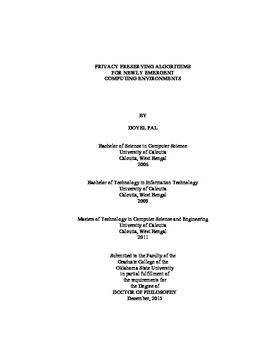| dc.contributor.advisor | Chen, Tingting | |
| dc.contributor.advisor | Thomas, Johnson P. | |
| dc.contributor.author | Pal, Doyel | |
| dc.date.accessioned | 2017-02-22T22:11:38Z | |
| dc.date.available | 2017-02-22T22:11:38Z | |
| dc.date.issued | 2015-12 | |
| dc.identifier.uri | https://hdl.handle.net/11244/48920 | |
| dc.description.abstract | Privacy preserving data usage ensures appropriate usage of data without compromising sensitive information. Data privacy is a primary requirement since customers' data is an asset to any organization and it contains customers' private information. Data seclusion cannot be a solution to keep data private. Data sharing as well as keeping data private is important for different purposes, e.g., company welfare, research, business etc. A broad range of industries where data privacy is mandatory includes healthcare, aviation industry, education system, federal law enforcement, etc. | |
| dc.description.abstract | In this thesis dissertation we focus on data privacy schemes in emerging fields of computer science, namely, health informatics, data mining, distributed cloud, biometrics, and mobile payments. Linking and mining medical records across different medical service providers are important to the enhancement of health care quality. Under HIPAA regulation keeping medical records private is important. In real-world health care databases, records may well contain errors. Linking the error-prone data and preserving data privacy at the same time is very difficult. We introduce a privacy preserving Error-Tolerant Linking Algorithm to enable medical records linkage for error-prone medical records. Mining frequent sequential patterns such as, patient path, treatment pattern, etc., across multiple medical sites helps to improve health care quality and research. We propose a privacy preserving sequential pattern mining scheme across multiple medical sites. In a distributed cloud environment resources are provided by users who are geographically distributed over a large area. Since resources are provided by regular users, data privacy and security are main concerns. We propose a privacy preserving data storage mechanism among different users in a distributed cloud. Managing secret key for encryption is difficult in a distributed cloud. To protect secret key in a distributed cloud we propose a multilevel threshold secret sharing mechanism. Biometric authentication ensures user identity by means of user's biometric traits. Any individual's biometrics should be protected since biometrics are unique and can be stolen or misused by an adversary. We present a secure and privacy preserving biometric authentication scheme using watermarking technique. Mobile payments have become popular with the extensive use of mobile devices. Mobile applications for payments needs to be very secure to perform transactions and at the same time needs to be efficient. We design and develop a mobile application for secure mobile payments. To secure mobile payments we focus on user's biometric authentication as well as secure bank transaction. We propose a novel privacy preserving biometric authentication algorithm for secure mobile payments. | |
| dc.format | application/pdf | |
| dc.language | en_US | |
| dc.rights | Copyright is held by the author who has granted the Oklahoma State University Library the non-exclusive right to share this material in its institutional repository. Contact Digital Library Services at lib-dls@okstate.edu or 405-744-9161 for the permission policy on the use, reproduction or distribution of this material. | |
| dc.title | Privacy preserving algorithms for newly emergent computing environments | |
| dc.contributor.committeeMember | Crick, Christopher John | |
| dc.contributor.committeeMember | Sheng, Weihua | |
| osu.filename | Pal_okstate_0664D_14355.pdf | |
| osu.accesstype | Open Access | |
| dc.type.genre | Dissertation | |
| dc.type.material | Text | |
| thesis.degree.discipline | Computer Science | |
| thesis.degree.grantor | Oklahoma State University | |
